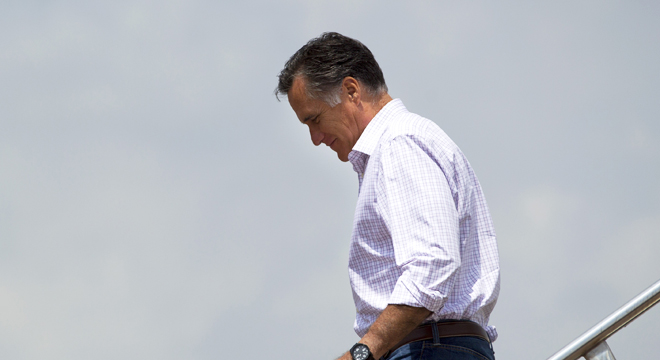Mitt Romney wants to boast about his signature policy achievement — universal health care in Massachusetts — but the right won’t let him.
It’s no secret that Romney has an uneasy alliance with the conservative base. But the movement’s reaction when he nodded at Romneycare wasn’t an isolated freakout about the one issue they disagree on. It was a warning to Romney that he veers from orthodoxy at his peril.
When it became clear that Romney would be the GOP nominee, the right, suspicious of his moderate past, undertook an effort to rob him of his governing agency. That’s included constraining his options on everything from tax policy to his vice presidential pick. The clamor when he claimed credit for Romneycare exemplifies what happens when he bucks those constraints.
“We are not auditioning for fearless leader,” Grover Norquist told conservatives at the CPAC convention in February. “We don’t need a president to tell us in what direction to go. We know what direction to go. We want the Ryan budget. … We just need a president to sign this stuff. We don’t need someone to think it up or design it. The leadership now for the modern conservative movement for the next 20 years will be coming out of the House and the Senate.”
Norquist went on: “Pick a Republican with enough working digits to handle a pen to become president of the United States. This is a change for Republicans: the House and Senate doing the work with the president signing bills. His job is to be captain of the team, to sign the legislation that has already been prepared.”
Those are the marching orders, and thus far they’ve controlled Romney’s campaign. Romney’s health care heresy was the biggest breach, and the right’s reaction was swift and demeaning — one compared it, in a widely approved tweet, to
The most recent manifestation is an all-hands-on-deck effort to make Romney pick Paul Ryan as his vice president. Choosing Ryan would heighten the substantive stakes of the election, but it would also put a watchdog on the ticket — one who would be disinclined to march along if Romney wandered away from the conservative agenda.
“The clamor you are hearing for Paul Ryan for VP is not about helping the Romney candidacy,” wrote conservative writer, and former George W. Bush aide, David Frum. “It’s about controlling the Romney campaign–and ultimately the Romney presidency. It’s about forcing a platform on Romney, and then dictating the agenda for that presidency’s first year. The platform happens to be suicidal, and the agenda impossible, but that does not matter to the Ryan advocates. They take the old Tammany Hall point of view: ‘Better to lose an agenda than lose control of the party.’ In that sense, the Ryan proposal is a test of Romney’s leadership. If he accedes, it’s a big surrender of control–and a surrender to many of those who most opposed (and who inwardly continue to dislike) his nomination.”
By contrast, the Democratic platform in 2008 was not forced on then-candidate Obama by a liberal base. Single payer advocates were forced to settle for a far less radical universal health care plan, and during the primary, the candidates adopted similar plans in competition with each other.
“The [Democratic] presidential nominee has an enormous amount of sway over the platform,” says Howard Dean, who was DNC chairman at the time. “There is some push and pull, but the nominee gets his way most of the time.”
In an interview, Dean acknowledged that there are some issues, such as women’s choice, that no Democratic candidate could feasibly support or append to the party platform.
“There are some bedrock principles,” he said. “The gay rights stuff was interesting because that was essentially pushed very hard by a group of DNC members. But generally the nominee gets his way.”
Dean says he believes Romney will be forced to serve as an autopen for the types of policies congressional Republicans pushed hard in 2011 and 2012. And he attributes the differences in the ways the parties operate to demographics.
“[I]n some ways we’re a more democratic party,” he said. “We tend to be much more tolerant of differences between people. They’re more like if you’re not with me you’re the enemy. [In the Democratic party] there’s a lot of give and take, push and pull. We work things out, even if it gets a little messy sometimes. The Republican party’s much more monolithic: mostly white, mostly Christian, mostly old.”






